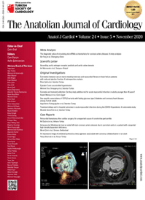
Anatolian Journal of Cardiology
Scope & Guideline
Connecting Global Hearts with Cutting-edge Cardiovascular Knowledge.
Introduction
Aims and Scopes
- Clinical Cardiology:
The journal publishes research that addresses clinical practice issues, treatment outcomes, and management strategies for cardiovascular diseases. - Interventional Cardiology:
There is a strong focus on studies related to catheter-based interventions, including percutaneous coronary interventions and transcatheter valve replacements. - Cardiovascular Imaging:
Research involving advanced imaging techniques such as echocardiography, magnetic resonance imaging, and computed tomography is prominently featured. - Cardiovascular Pharmacology:
The exploration of pharmacological therapies, including novel anticoagulants and heart failure medications, is a significant aspect of the journal. - Cardiovascular Genetics and Risk Factors:
The journal includes studies on genetic predispositions to cardiovascular diseases and the impact of various risk factors on heart health. - Public Health and Epidemiology:
Research addressing public health concerns, epidemiological studies, and the impact of cardiovascular diseases on populations is also a focus area.
Trending and Emerging
- Telemedicine and Digital Health:
The integration of telemedicine and digital health technologies in cardiology is gaining traction, with research focusing on remote monitoring and virtual care models. - Artificial Intelligence in Cardiology:
There is a growing emphasis on the application of artificial intelligence and machine learning to improve diagnostic accuracy and patient management. - Cardio-Oncology:
Research exploring the intersection of cardiology and oncology, particularly the cardiovascular effects of cancer therapies, is emerging as a significant area of interest. - Post-COVID Cardiology:
Studies examining the cardiovascular implications of COVID-19, including long-term effects and management strategies, are increasingly prevalent. - Personalized Medicine:
The trend towards personalized approaches in cardiovascular care, based on genetic and phenotypic characteristics, is becoming more prominent.
Declining or Waning
- Basic Science Research:
There has been a noticeable decline in studies focused on fundamental cardiovascular biology and pathophysiology, suggesting a shift towards more clinically oriented research. - Traditional Risk Factor Assessment:
Research centered on traditional cardiovascular risk factors such as hypertension and hyperlipidemia appears to be less frequent, possibly in favor of more complex and multifactorial analyses. - Pediatric Cardiology:
Although pediatric topics remain essential, the volume of research specifically addressing pediatric cardiology has waned, indicating a potential need for renewed focus. - Longitudinal Cohort Studies:
There is a decreasing trend in long-term follow-up studies, which may reflect a shift towards more immediate outcomes and clinical trials. - Surgical Techniques:
Research on traditional open-heart surgical techniques has seen a decline, possibly due to the rise of minimally invasive and interventional approaches.
Similar Journals

Cardiology Journal
Innovating the landscape of cardiovascular medicine.Cardiology Journal, published by VIA MEDICA, stands as a prominent resource in the field of cardiology and cardiovascular medicine, with an ISSN of 1897-5593 and an E-ISSN of 1898-018X. Recognized for its Open Access model established since 1994, this journal facilitates widespread dissemination of critical research findings, allowing practitioners and researchers globally to access valuable insights without barriers. Based in Poland, with an address at UL SWIETOKRZYSKA 73, 80-180 GDANSK, it has achieved a respectable Q2 classification in 2023 for both Cardiology and Miscellaneous Medicine categories, reflecting its influence and quality within the scholarly community. With a Scopus ranking placing it at #117 out of 387 in Cardiology, it lies within the 69th percentile, underpinning its commitment to advancing knowledge in cardiovascular health. The journal’s converged years extending from 2006 to 2024 ensure it captures ongoing developments in a rapidly evolving field. As such, the Cardiology Journal serves as an indispensable platform for researchers, professionals, and students dedicated to exploring the frontiers of cardiac science and improving patient care.

Expert Review of Cardiovascular Therapy
Connecting Theory and Practice in Cardiovascular TherapyExpert Review of Cardiovascular Therapy is a leading academic journal published by TAYLOR & FRANCIS INC, focusing on innovative and impactful research in the field of cardiovascular medicine. With an ISSN of 1477-9072 and an E-ISSN of 1744-8344, this journal serves as an essential resource for researchers, clinicians, and educators, offering a platform for the dissemination of critical advancements in cardiovascular therapy and internal medicine. Since its inception in 2003, the journal has maintained a reputable standing with a Q2 ranking in various categories including Cardiology and Cardiovascular Medicine, reflecting its influence and rigor in the field. The journal, which is based in the United Kingdom, does not currently offer Open Access options, ensuring that its content is accessible primarily to subscribers. With its commitment to high-quality, peer-reviewed articles, Expert Review of Cardiovascular Therapy is dedicated to bridging the gap between experimental research and clinical application, thereby enhancing patient care and therapeutic outcomes in cardiovascular health.
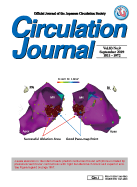
CIRCULATION JOURNAL
Exploring the Frontiers of Heart Health Research.CIRCULATION JOURNAL, published by the Japanese Circulation Society, stands as a premier platform for cutting-edge research in the fields of Cardiology and Cardiovascular Medicine. With an impressive impact factor placing it in the Q1 quartile for both cardiology and general medicine, this journal is essential for researchers and practitioners seeking to stay at the forefront of cardiovascular science. The journal's accessible open access options ensure that groundbreaking studies are widely disseminated, reflecting its commitment to advancing medical knowledge and improving patient care. Since its inception in 1996, CIRCULATION JOURNAL has fostered a global dialogue on vital cardiovascular issues, making it a vital resource for academics, healthcare professionals, and students alike. With its base in Tokyo, Japan, the journal not only highlights regional advancements but also contributes significantly to the global medical community.

JOURNAL OF INVASIVE CARDIOLOGY
Connecting Professionals to the Latest in Cardiac InnovationJOURNAL OF INVASIVE CARDIOLOGY, a reputable publication by H M P COMMUNICATIONS, is dedicated to advancing the field of cardiology and cardiovascular medicine through rigorous research and scholarly discussion. With an ISSN of 1042-3931 and an E-ISSN of 1557-2501, this journal serves as a crucial resource for healthcare professionals, researchers, and students who seek to stay informed about the latest findings and innovations in invasive cardiology. Having achieved a 2023 Scopus rank of #185 out of 636 in General Medicine, placing it in the 70th percentile, the journal is recognized for its significant contributions to medical science, evidenced by its Q2 ranking in Radiology, Nuclear Medicine and Imaging, and Q3 status in both Cardiology and Cardiovascular Medicine. The journal has been in circulation since 1990 and continues to foster a platform for critical research in the United States, ensuring accessibility to vital information necessary for enhancing patient care and clinical practices within the domain of invasive procedures.

Journal of Veterinary Cardiology
Empowering Veterinary Professionals with Cutting-Edge FindingsJournal of Veterinary Cardiology is a leading scientific publication dedicated to the field of veterinary cardiology, published by ELSEVIER. With an ISSN of 1760-2734 and E-ISSN 1875-0834, this journal plays a crucial role in disseminating cutting-edge research and clinical insights into animal cardiovascular health. With a strong emphasis on the interrelations of veterinary science and physiology, it boasts an impressive ranking in the Q1 category for miscellaneous veterinary studies and a significant position at 69th percentile in general veterinary rankings according to Scopus. Researchers, professionals, and students are encouraged to engage with the journal's diverse array of articles that span basic research to clinical applications, bridging knowledge gaps in veterinary cardiology. This important resource showcases impactful studies from its inception in 1999 and remains a steadfast conduit for the advancement of knowledge in the field through 2024 and beyond.
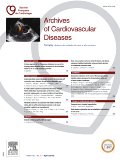
Archives of Cardiovascular Diseases
Pioneering research and collaboration in cardiology.The Archives of Cardiovascular Diseases, published by Elsevier Masson, stands as a leading journal in the field of cardiology and cardiovascular medicine, with an impressive impact factor that underscores its relevance and influence. This esteemed journal, recognized in the Q2 category for both cardiology and miscellaneous medicine, aims to disseminate groundbreaking research, innovative methodologies, and clinical advancements that can shape the future of cardiovascular health. With its diverse array of open access options, researchers and students alike have the ability to engage with high-quality content, ensuring that cutting-edge findings are accessible globally. Since its inception in 2008, the journal has actively contributed to the advancement of knowledge in cardiovascular diseases, fostering collaboration among clinicians, researchers, and educators. Headquartered in Paris, France, Archives of Cardiovascular Diseases remains committed to enhancing our understanding of cardiovascular health and improving patient outcomes worldwide.
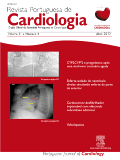
Revista Portuguesa de Cardiologia
Fostering collaboration and knowledge in the heart of cardiology.Revista Portuguesa de Cardiologia, published by Elsevier España SLU, stands as a pivotal resource in the realm of Cardiology and Cardiovascular Medicine. With its origins tracing back to 1970, this journal has cultivated a robust academic presence, achieving a 2023 Q3 ranking in its category, and currently holding a position of #220 out of 387 on the Scopus rankings, placing it within the 43rd percentile of its field. This open access journal, available since 2011, aims to disseminate high-quality research and insights relevant to contemporary cardiovascular issues. Its commitment to accessibility and knowledge exchange enhances its importance for clinicians, researchers, and students alike, fostering a more informed community in the fight against cardiovascular diseases. Operating from its base in Barcelona, Spain, the journal welcomes contributions that further the understanding and treatment of heart conditions, contributing significantly to the advancement of cardiovascular health.
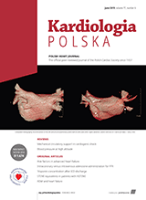
Kardiologia Polska
Innovative Research for a Healthier TomorrowKardiologia Polska, the esteemed journal of the Polish Cardiac Society, has established itself as a vital resource in the field of cardiology and cardiovascular medicine since its inception in 1954. With an ISSN of 0022-9032 and an E-ISSN of 1897-4279, this journal serves as a platform for groundbreaking research and scholarly articles that contribute to the advancement of heart health. Although currently not an open access journal, it remains an essential reference for practitioners and researchers seeking to stay abreast of the latest developments in cardiovascular science. The journal reflects its scholarly depth through a Category Quartile of Q3 and a commendable Scopus ranking at the 48th percentile in its field. Published primarily in Poland, it caters to a global audience eager to explore comprehensive studies spanning clinical cardiology, innovative therapeutic approaches, and emerging cardiovascular trends. Join a thriving academic community by engaging with the invaluable insights and research contributions found within the pages of Kardiologia Polska.

Revista de la Federacion Argentina de Cardiologia
Shaping the future of cardiovascular medicine with every publication.Revista de la Federacion Argentina de Cardiologia is a vital publication in the field of Cardiology and Cardiovascular Medicine, providing a platform for researchers and healthcare professionals to share significant findings and innovative concepts since its inception in 2012. Published by the Federacion Argentina Cardiology, this journal specifically addresses contemporary issues and advancements within cardiology, contributing to the scholarly dialogue essential for improving cardiovascular health. Despite being categorized in the Q4 quartile for 2023 and presently ranking #358 out of 387 in its field, the journal remains committed to fostering academic inquiry and disseminating valuable research for both local and global audiences. Although it is not an open-access journal, it strives to balance accessibility with rigorous academic standards, ensuring quality contributions that are critical for practitioners and students alike. The journal’s ongoing evaluation and adaptation in the ever-evolving landscape of cardiology underscore its importance in advancing cardiovascular science and practice.
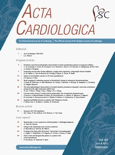
ACTA CARDIOLOGICA
Pioneering insights in cardiology and cardiovascular medicine.ACTA CARDIOLOGICA is a distinguished journal published by TAYLOR & FRANCIS LTD, focusing on the dynamic fields of Cardiology and Cardiovascular Medicine. Established in 1946, the journal has maintained a significant presence in the academic community, providing a platform for cutting-edge research and clinical studies that aim to address challenges in cardiovascular health. With its Q3 rating in both Cardiology and General Medicine categories, it showcases a robust compilation of articles that reflect the evolving landscape of cardiac care. Although ACTA CARDIOLOGICA is not an Open Access journal, it continues to serve a vital role for researchers, professionals, and students dedicated to advancing knowledge in cardiovascular health. This journal, with an ISSN of 0001-5385 and E-ISSN of 1784-973X, is a critical resource for those looking to stay updated on the latest developments and practices in the specialization, contributing significantly to the field until 2024 and beyond.